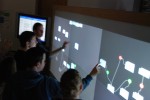
We are delighted to be hosting a visit from Martin Caminada who has recently joined the University of Aberdeen. He will be here on 12 December to deliver a seminar in Wolfson entitled,
Argumentation as Inference versus Argumentation as Dialogue —
reconciling two lines of research
Abstract:
In the formal argumentation community, one can distinguish two main lines of research: argumentation as inference and argumentation as dialogue. The first line of research, going back to the work of Pollock, Vreeswijk and Simari & Loui, is focused in argumentation as a way of performing non-monotonic entailment. That is, it is focused on the *outcome* of argumentation. The second line of research, going back to the work of Hamblin, Mackenzie and Walton & Krabbe, is focused on argumentation as dialectics, involving various actors. That is, it is focused on the *process* of argumentation.
In our recent work, we aim to reconcile these two lines of research.
That is, we aim to express argument-based entailment as the ability to
win a discussion. In particular, we are able to show that:
(1) grounded semantics can be interpreted in terms of a persuasion dialogue
(2) (credulous) preferred semantics can be interpreted in terms of Socratic dialogue
(3) ideal and stable semantics can both be interpreted as specific sub-forms of Socratic dialogue
Apart from abstract argumentation, we also examine the possibilities of redefining ASPIC-style entailment in terms of structured dialogue. In general, we think that argument-based inference is not so much about what is true, but about what can be defended in rational discussion.








 Together with
Together with  Chris is today taking part in an
Chris is today taking part in an 